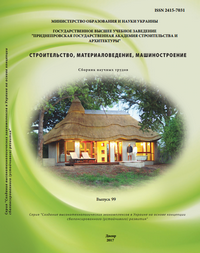Adaptive management for circular economy
Keywords:
circular economy, adaptive management, sustainable development, voluntary sustainability standards.Abstract
Purpose. The purpose of the presented research is to explore the potential of adaptive management for introducing the circular production principles under conditions of transitional economy. Methodology. The systems thinking approach allowed to analyse the domain of circular economy and to identify the main tasks of adaptive management aimed at introducing the circularity principles by industrial enterprises. Findings. The study examined the problem of the circular economy management in the context of transition to sustainable production and consumption. The authors demonstrated a need for the adoption of the adaptive management methods by producers, identified the main areas of their application and discussed particular aspects of their procedures relevant for the objectives of circular economy. Originality. The study reviewed the scientific concept and practical application of the adaptive management in the context of sustainable development and analysed its potential for the circular economy in transitional economies. Practical value. The suggested system of adaptive management may be useful for the planning of activities aimed at strengthening the capacity of the circular economy, as well as for the formation of competitive advantages on industrial markets.
References
Manifesto for a resource-efficient Europe. Adopted in Brussels, 17 December 2012. European Commission: (EREP). Available at: http://europa.eu/rapid/press-release_MEMO-12-989_en.htm. (Accessed 15 April 2017).
The Millennium Development Goals Report 2015 (United Nations). Available at: http://www.un.org/ millenniumgoals/2015_MDG_Report/pdf/MDG%202015%20rev%20(July%201).pdf. (Accessed 15 April 2017).
Shvets V., Palekhova L. Energy strategy of Ukraine: modern challenges. In: International workshop “Energy supply and energy efficiency” Azerbaijan TU, Baku, 2015. Cottbus: BTU Cottbus – Senftenberg, 2015. PP. 7-9. ISSN 3-9810211-8-5.
Palekhova L., Palekhov D. Conceptual framework for balancing economic growth and environmental sustainability at regional level. InScientific Bulletin of National Mining University 1, 2016. PP. 144-148: 137-141. ISSN 2071-2227.
Palekhov D. Potential for Strategic Environmental Assessment (SEA) as a Regional Planning Instrument in Ukraine . Umweltrecht in Forschung und Praxis, Band 66. Hamburg: Dr. Kovač, 2014. 374 р. ISBN-13: 978-3830078968 .
Closing the loop New circular economy package (European Parliamen Briefing, January 2016). Available at: http://www.europarl.europa.eu/RegData/etudes/BRIE/2016/ 573899/EPRS_BRI(2016)573899_EN.pdf. (Accessed 15 April 2017).
Towards the Circular Economy. Economic and business rationale for an accelerated transition (Economic and business rationale for an accelerated transition. Rethink the future). Ellen MacArthur Foundation, 2013, Vol. 1,198 р.
Palekhova L., Pivnyak G. Exploring market strategies based on voluntary environmental certification in a Post-Soviet transition economy. In: Voluntary Standard Systems. Vol.1. Springer: New York-London, 2014. РР. 165-175. ISBN 978-3-642-35715-2.
Pivnyak G. G., Shvets V., Ya., Palekhova L. L. Responsible mining: initiatives and problems of implementation. In: Management for sustainable development in transitional economies: Monograph. 2nd Ed., Vol. 2. Dnipro, pp. 25-40. (In Russian).
Palekhova L. L. Management for sustainable development: handbook on conceptual framework. A textbook for university students. Accent, Dnipro, 2017, 258 p. (In Ukrainian). style?�n-0����pt;font-family:"Times New Roman","serif";mso-fareast-font-family: TimesNewRomanPSMT;mso-ansi-language:EN-US'> ресурс]. – Режим доступу: http://www.europarl.europa.eu/RegData/etudes/BRIE/2016/ 573899/EPRS_BRI(2016)573899_EN.pdf. – Перевірено: 15.04.2017.
Downloads
Published
Issue
Section
License
Редакція Видання категорично засуджує прояви плагіату в статтях та вживає всіх можливих заходів для його недопущення. Плагіат розглядається як форма порушення авторських прав і наукової етики.
При виявлені у статті більш ніж 25% запозиченого тексту без відповідних посилань та використання лапок, стаття кваліфікується як така, що містить плагіат. У цьому випадку стаття більше не розглядається редакцією, а автор отримує перше попередження.
Автори, в статтях яких повторно виявлено плагіат, не зможуть публікуватися в усіх журналах Видавництва ДВНЗ «Придніпровська державна академія будівництва та архітектури».
Автори, які публікуються у цьому журналі, погоджуються з наступними умовами:
- Автори залишають за собою право на авторство своєї роботи та передають журналу право першої публікації цієї роботи на умовах ліцензії Creative Commons Attribution License, котра дозволяє іншим особам вільно розповсюджувати опубліковану роботу з обов'язковим посиланням на авторів оригінальної роботи та першу публікацію роботи у цьому журналі.
- Автори мають право укладати самостійні додаткові угоди щодо неексклюзивного розповсюдження роботи у тому вигляді, в якому вона була опублікована цим журналом (наприклад, розміщувати роботу в електронному сховищі установи або публікувати у складі монографії), за умови збереження посилання на першу публікацію роботи у цьому журналі.
- Політика журналу дозволяє і заохочує розміщення авторами в мережі Інтернет (наприклад, у сховищах установ або на особистих веб-сайтах) рукопису роботи, як до подання цього рукопису до редакції, так і під час його редакційного опрацювання, оскільки це сприяє виникненню продуктивної наукової дискусії та позитивно позначається на оперативності та динаміці цитування опублікованої роботи (див. The Effect of Open Access).

